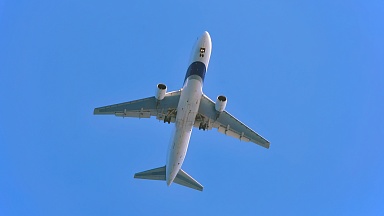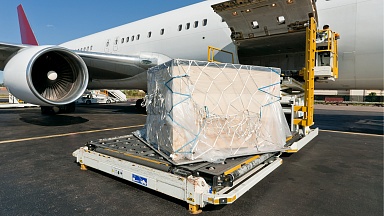Air freight’s annual autumn and winter peak season has arrived a month early, air freight forwarders and sources are reporting, due to a combination of factors including manufacturing production delays, ocean freight turmoil, and Covid-related air capacity reductions and regional lockdowns.
UK freight forwarder Metro Shipping highlighted that peak season for air cargo traditionally arrives in the latter half of September, describing the end-of-year surge in demand as «predictable, although always a pain to negotiate and ensure that product, raw materials and components are available for the busy back end of the year, including the traditional retail festive season».
In a briefing today to customers it said: «This year, air freight has become an essential mode earlier than usual, in August. As a result of production delays during the manufacturing process, ocean freight turmoil, airport closures, productivity delays and, of course, COVID-19 impact and regional lockdowns affecting all of the aforementioned, we are seeing a surge in demand and reduction in airline capacity.
«Over the last week alone, we have experienced Shanghai Airport — Pudong — operating at 20% capacity due to air crew restrictions resulting in flight cancellations and operational issues with whole cargo terminals shut down and staff having to isolate on a cyclical basis. Dhaka Airport is also suffering from delays, with overwhelming demand for air freight uplift, due to ocean freight failures and lockdown fallout, with the consequences being catastrophic.»
Increasing rates by the day
It stressed that «these occurrences are not unique and are being seen throughout the Indian subcontinent, southeast Asia and China, along with many other trade lanes globally, causing instability and unreliability in the critical express air freight market. Airlines are increasing rates by the day and westbound cargo rates have increased significantly in a week.»
Export cargo from Europe has also been «traumatised by the further reduction in capacity, with carriers having to cancel scheduled cargo flights due to air crew restrictions», Metro highlighted, adding: «Passenger driven demand has still not returned and the long-haul market looks unpredictable and doubtful for the rest of the year, resulting in a continued reliance on cargo-only capacity and flights, in the form of pure freighters and passenger converted aircraft — carrying only cargo on all major routes, from Asia to global destinations.»
Carriers have withdrawn capacity agreements
The forwarder added: «Many carriers have withdrawn their capacity agreements and are now quoting daily or weekly rates based on a spot basis only. And this is in August, with four months of the year to unwind and assuming — hoping — there is no further disruption to ocean freight services, which seem to be occurring on a regular basis.»
Metro said it was continuing to keep customers and partners updated with developments, «which are occurring on an almost daily basis, from and to all regions of the world in relation to air freight services» — including charter operations and alternative sea-air and truck-air modes of transport.
Driver shortages add to air freight pressures
Robert Jubb, UK head of freight at air charter broker Air Partner, said driver shortages were adding to the air freight pressures in the UK market.
«As a result of the ongoing disruption to the global supply chain and shortages of HGV drivers, there are concerns around fulfilling orders in the lead-up to Christmas,» he noted. «We expect to see an increase in demand for dedicated cargo flights from major retailers seeking to minimise disruption to their global supply chain and continue serving their customers.
«Recent complications to supply chains due to Brexit and a lack of available HGV drivers has seen our enquiries for air freight increase by as much as 60% to meet demand for orders typically fulfilled via sea or road transportation.»
Conversion from sea freight
But conversion from sea freight was also a major factor.
«Sea freight is experiencing significant delays in shipping, due to a short supply of available containers and costs are at their highest, which is driving further interest in air freight,» Jubb highlighted. «Sea freight continues to run beyond maximum capacity and cargo aircraft are close to being fully-booked between September and the end of the year.»
He concluded: «With retailers already feeling the disruption to the supply chain, we expect demand for air freight to surge in the short-term as retailers are recommending to customers to buy their toys and presents earlier than usual ahead of a busy Christmas period. We expect to be busier than ever as enquiries from retailers increase for the charter of toys as well as high-value items such as designer clothes, games consoles, mobile phones and laptops.»
‘Extremely challenging’ peak season
As reported last week, constrained capacity and elevated prices continue to be the dominant features of the air cargo charter market, with other leading air freight brokers predicting an extremely challenging peak season as strong demand rises even further to a backdrop of ocean freight chaos and buoyant cross-border e-commerce volumes. Capacity remains very tight for full freighters while the space offered by passenger aircraft operating in all-cargo mode (preighters or P2Fs) is also in high demand, Chapman Freeborn’s head of cargo, Pierre Van der Stichele, told Lloyd’s Loading List.
«Between spring and summer, we did see a slight easing for a short period but the capacity crunch is back on. Due to recent events taking place in the world, such as the recent earthquake in Haiti, we are already seeing further demand with relief agencies needing capacity for humanitarian flights.»
He said it was «practically impossible» to obtain wide-bodied freighter capacity at short notice unless there was a last-minute cancellation of a flight which sometimes occurs due to a delay with cargo.«
Air Charter Service’s (ACS) director, London Cargo, James Cristofoli, explained to Lloyd’s Loading List that over the last few months, the company had continued to see a rise in charter prices on the major trade lanes — «a sign that capacity is squeezing slightly. There is some ‘short notice’ capacity but you have to pay a premium for it and it might not meet all of your requirements.»
Rates on the up
Since March 2020, air cargo charter rates have been higher than pre-COVID and at their highest levels reached close to +200%, Van der Stichele noted. «We experienced a drop in rates early summer but that’s picked up again. Rates are not as high as they were at the height of the PPE transport surge but are very likely to return (to such levels) once we enter the peak season — it’s a matter of a week or two in my opinion. Additionally, fuel prices are increasing which is further raising charter rates.»
Cristofoli said rates have been slowly increasing over the last 2-3 months and remain at elevated levels — «although they are not yet back to their mid-pandemic highs.»
He said ACS is seeing strong demand for air cargo charter capacity «on the traditional trans-Pacific and China-Europe routes.
«It is hard for us to know the precise driver behind all our charter enquiries. However, it is likely that the ocean freight chaos has pushed some shippers and forwarders towards air charters, where they will make the comparison of ’sea freight cost + late penalty’ versus ’air charter cost.’ E-commerce is still a large piece of the air cargo puzzle. Due to its relatively predictable nature, this segment of the market gives shippers and forwarders the confidence to secure long term air charter capacity.»
Van der Stichele said demand «is strongest between China-Europe and China-US, which doesn’t mean that other sectors are not experiencing growth. Middle East-Africa, for instance, is also in high demand as well as Asia-Middle East. Bottlenecks at sea ports have led directly to overspills into airfreight while cross-border e-commerce continues to be a major driver (for air cargo charters). COVID has sent online purchasing through the roof and consumer expectation is for short delivery spans.»
Demand likely to outstrip capacity
Turning to the market outlook, he said: «The coming months will be extremely challenging and right now we do not see a respite anytime soon.»
Cristofoli concluded: «We are predicting that, as usual, demand on almost all lanes will increase gradually and significantly between now and the end of Q4. We expect that this increase in demand will likely outstrip any increase in capacity being added to the market, resulting in higher rates and increased difficulty in securing capacity in November and early December.»
New rates data
And new data from digital rates specialist Freightos reveals that fresh outbreaks of Covid-19 among air cargo handlers in Shanghai and other Chinese airports that are causing cancellations and a lot of uncertainty for ex-China air cargo are also pushing up air cargo rates, with spot prices ex-Shanghai rising 15-25% to US destinations this week and 12-15% to airports in Europe. These prices «are double their level a year ago and are at their highest point since May 2020 when the industry was under extreme pressure due to the rush on PPE», highlighted Judah Levine, head of research at Freightos.
As reported yesterday in Lloyd’s Loading List, disruptions and delays to air freight shipments through China’s largest cargo airport, Shanghai Pudong International (PVG), are mounting as new coronavirus infections have led to the closure of one of PVG’s main cargo terminals, reduced handling and customs capacity, and triggered flight cancellations, putting further pressure on already constrained capacity. As a result, airlines and freight forwarders have been scrambling to divert cargo shipments and deliveries to other airports or seek alternative capacity solutions.




